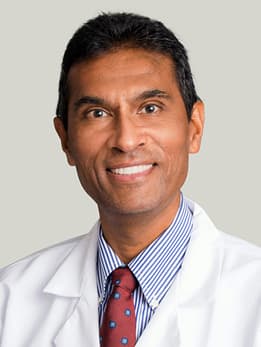UChicago Medicine performs two complex heart surgeries on one family

Gerald Gill, 60, of Madeira Beach, Florida, was feeling tired and short-winded when he flew to Chicago to be with his mother during her heart surgery. His symptoms had worsened in recent months to a point where the smallest task felt like running a marathon. "After carrying a couple of grocery bags into the house, I'd have to sit down, and I'd be huffing and puffing," he recalled.
He had gone through bypass surgery a few years earlier, and six months before his trip, he was diagnosed with another heart problem -- aortic stenosis, which involves a faulty heart valve not allowing adequate blood flow from the heart.
Gerald accompanied his 78-year-old mother, Betty Gill, to the University of Chicago Medicine for an appointment with her heart surgeon, Valluvan Jeevanandam, MD, chief of cardiac and thoracic surgery. They went over the details of her scheduled aortic valve replacement and bypass surgery. She had chosen the University of Chicago Medicine because it's one of the few centers in the country that specializes in bloodless surgery and can accommodate Jehovah's Witnesses.
It was during that consultation that Betty looked at her son and got worried. "I thought to myself, he's in worse shape than me. I was even ready to give up my surgical date if he needed it." That's when she asked Jeevanandam if someone could examine her son. Gerald was immediately referred to interventional cardiologist Atman Shah, MD, co-director of the cardiac catheterization laboratory and director of the coronary care unit.
Things moved faster and better than the Gill family could ever have hoped for. Over the next 18 hours, the hospital coordinated Gerald's out-of-state insurance coverage, worked him up with an echocardiogram and other imaging tests and scheduled surgery for the following day.
"He actually didn't have aortic stenosis," said Shah. "The angiogram showed that he had two branches off of his bypass graft that were uncharacteristically stealing blood from his heart." After a discussion with Jeevanandam, Shah opted for an innovative approach to what was a unique problem. "We used vascular plugs to stop the leakage so the blood could flow to the heart."
While one or two cases a year come to the University of Chicago Medicine, this particular case was unusual, given the large arteries involved. "It's rare to see, and has been recorded only once or twice in the literature," said Shah. Usually, surgeons are dealing with smaller arteries, which require small wire coil plugs. Instead, Shah, after consulting with Jeevanandam, settled on a type of vascular plug that had never been used for this application. "It's made from a metal designed by NASA called nitinol. It's rigid at room temperature and becomes malleable at body temperature, and it's typically used for arteries that come off the abdominal aorta," explained Shah.
"This case demonstrates not only our novel use of innovative technology, but also our multidisciplinary approach, as evident by the collaboration between cardiothoracic surgery and interventional cardiology to come up with what we thought would be best for the patient," Shah said.
Symptom-free after surgery, Gerald was at his mother's bedside by the time she was in recovery. Betty gets choked up when she remembers seeing her son when she woke up. "I was shocked to see him -- to think how they were able to take care of him so quickly."
"The fact that we were able to treat Gerald's unusual problem, as well as his mother's complex surgery, really highlights our unique capabilities. At the University of Chicago Medicine, we're really focused on innovation and advanced therapies," said Jeevanandam. "Here we are doing a complex procedure on a Jehovah's Witness that isn't offered in too many places, and is one of our distinctive features. And because she came here, we were able to take care of her son, too."
"I was at the best place I could ever be -- we both were," Betty said. "The best of care, the best of advice -- what they did is absolutely beyond words. I have nothing but praise for the doctors, surgeons and staff at the University of Chicago Medicine."

Valluvan Jeevanandam, MD
Dr. Valluvan Jeevanandam specializes in the surgical management of heart failure, and is an expert in high-risk cardiac surgery. He has performed more than 1,000 heart transplants — including the total artificial heart — and countless cardiac surgery procedures.
Learn more about Dr. Jeevanandam
Atman P. Shah, MD
Atman P. Shah, MD, is an interventional cardiologist who specializes in minimally invasive, catheter-based techniques. He cares for patients with complex structural heart disease, including congenital heart defects, and performs catheter-based procedures to reduce the risk of stroke in patients with atrial fibrillation.
Learn more about Dr. Shah